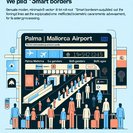
On the sidelines of the Web Summit in Lisbon, but announced from the company’s Madrid innovation hub, Visa on 12 November unveiled a pilot that allows corporates to push cross-border payments directly to employees’ digital wallets in US-dollar-backed stablecoins via Visa Direct. According to Europa Press, Spanish-based platforms can now send euro payouts, converted on-the-fly, to wallets such as Circle or Coinbase, with recipients opting to hold USDC or instantly swap into local currency.
For globally mobile staff—particularly freelancers on Spain’s digital-nomad visa or expatriates awaiting local bank accounts—the service promises near-instant settlement without the correspondent-bank fees that plague traditional wire transfers. Visa claims finality “within minutes”, contrasting with the two-to-three-day lag still common for SEPA cross-border credits originating outside the EU.
![Visa launches Madrid-piloted scheme to let assignees receive salaries in USDC stablecoins]()
Spanish fintechs including Bnext and Payflow are among the first testers, focusing on gig-economy payouts and short-term contractor wages. Payroll providers say the model could extend to per-diem reimbursements for business travellers—eliminating currency spreads when employees move between euro and non-euro destinations.
Regulators are watching closely. Spain’s CNMV classifies USDC as a “referenced crypto-asset” under MiCA and will require full reserve attestations and disclosure. Visa stressed that conversions are handled by regulated crypto-exchanges with real-time AML checks, and that companies can initiate payments in euros, absorbing no crypto-volatility risk.
Practical tip: Mobility managers should review corporate treasury policies before joining the pilot—some firms prohibit holding crypto assets on balance sheet. But early adopters could cut transfer fees by 60-70 % and give assignees faster access to funds, easing cash-flow headaches during relocations.
For globally mobile staff—particularly freelancers on Spain’s digital-nomad visa or expatriates awaiting local bank accounts—the service promises near-instant settlement without the correspondent-bank fees that plague traditional wire transfers. Visa claims finality “within minutes”, contrasting with the two-to-three-day lag still common for SEPA cross-border credits originating outside the EU.

Spanish fintechs including Bnext and Payflow are among the first testers, focusing on gig-economy payouts and short-term contractor wages. Payroll providers say the model could extend to per-diem reimbursements for business travellers—eliminating currency spreads when employees move between euro and non-euro destinations.
Regulators are watching closely. Spain’s CNMV classifies USDC as a “referenced crypto-asset” under MiCA and will require full reserve attestations and disclosure. Visa stressed that conversions are handled by regulated crypto-exchanges with real-time AML checks, and that companies can initiate payments in euros, absorbing no crypto-volatility risk.
Practical tip: Mobility managers should review corporate treasury policies before joining the pilot—some firms prohibit holding crypto assets on balance sheet. But early adopters could cut transfer fees by 60-70 % and give assignees faster access to funds, easing cash-flow headaches during relocations.










